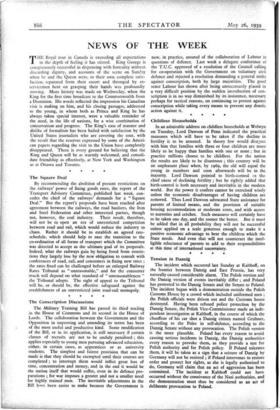The Conscription Discussions The Military Training Bill has passed its
third reading in the House of Commons and its second in the House of Lords. The collaboration between the Government and the Opposition in improving and amending its terms has been of the most useful and productive kind. Some modification of the Bill, or in its application, is still necessary if certain classes of recruits are not to be unduly penalised ; this applies especially to young men pursuing advanced education, either, in certain cases, as apprentices or as university students. The simplest and fairest provision that can be made is that they should be exempted until their courses are completed ; to interrupt them would inflict great loss of time, concentration and money, and in the end it would be the nation itself that would suffer, even in its defence pre- parations; for war imposes a greater and not a smaller need for highly trained men. The inevitable adjustments in the Bill hlve been easier to make because the Government is now, in practice, assured of the collaboration of Labour in questions of defence. Last week a delegate conference of the T.U.C. approved of a resolution of the Council calling for co-operation with the Government on voluntary civil defence and rejected a resolution demanding a general strike against conscription, both by large majorities. The good sense Labour has shown after being unnecessarily placed in a very difficult position by the sudden introduction of con- scription is in no way diminished by its insistence, necessary perhaps for tactical reasons, on continuing to protest against conscription while taking every meanc to prevent any drastic action against it.


























































 Previous page
Previous page